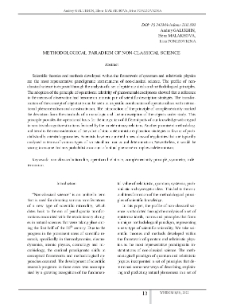Object
Title: Methodological Paradigm of Non-Classical Science
Journal or Publication Title:
Date of publication:
Volume:
Number:
ISSN:
Corporate Creators:
Խ․ Աբովյանի անվան հայկական պետական մանկավարժական համալսարան
Coverage:
Abstract:
Scientific theories and methods developed within the framework of quantum and relativistic physics are the most representative paradigmatic instantiations of non-classical science. The profile of nonclassical science is exposed through the analysis of a set of epistemic ideals and methodological principles. The adoption of the principle of operational relativity of phenomenal descriptions showed that a reference to the means of observation had become an intrinsic part of scientific description strategies. The transformation of the concept of objectivity can be seen in a specific combination of operationalism with interactional phenomenalism and constructivism. The introduction of the principle of complementarity marked the deviation from the standards of a monologic and linear description of the objects under study. This principle provides the operational basis for the integration of different parts of our knowledge with regard to non-trivial cognitive situations featured by the indeterminacy relations. Another prominent methodological trend is the reconsideration of the value of strict deterministic explanation strategies in favour of probabilistically oriented approaches. Scientists have encountered a new class of regularities that are typically analysed in terms of various types of statistical and non-causal determination. Nevertheless, it would be wrong to assume that any probabilistic account of natural phenomena implies indeterminism.
Place of publishing:
Երևան
Publisher:
Format:
Identifier:
oai:arar.sci.am:371994
Language:
Object collections:
Last modified:
Oct 8, 2025
In our library since:
Mar 28, 2024
Number of object content hits:
71
All available object's versions:
https://arar.sci.am/publication/401835
Show description in RDF format:
Show description in OAI-PMH format:
-
Իմաստություն=Wisdom=Мудрость
-
Իմաստություն, 2013, N 1
-
Իմաստություն, 2014, N 1 (2)
-
Իմաստություն, 2014, N 2 (3)
-
Իմաստություն, 2015, N 1 (4)
-
Wisdom, 2015, N 2 (5)
-
Wisdom, 2016, N 1 (6)
-
Wisdom, 2016, N 2 (7)
-
Wisdom, 2017, N 1 (8)
-
Wisdom, 2017, N 2 (9)
-
Wisdom, 2018, N 1 (10)
-
Wisdom, 2018, N 2 (11)
-
Wisdom, 2019, N 1 (12)
-
Wisdom, 2019, N 2 (13)
-
Wisdom, 2020, N 1 (14)
-
Wisdom, 2020, N 2 (15)
-
Wisdom, 2020, N 3 (16)
-
Wisdom, 2021, N 1 (17)
-
Wisdom, 2021, N 1 (1) Special issue
-
Wisdom, 2021, N 2 (18)
-
Wisdom, 2021, N 3 (19)
-
Wisdom, 2021, N 4 (20)
-
Wisdom, 2022, N 1 (21)
- Editorial board
- Contents
- Editor`s Foreword
- Cognitive Signified as Mental Representation of Realia
- Methodological Paradigm of Non-Classical Science
- Stoic Logic from the Theory of Mental Models
- Comparative Analysis of the Level of Psychological Well-Being Among RF and RA Students
- Self-Actualization and Stress Resistance: Methodological and Practical Aspects of Studying the Personality of Students in the Process of Distance Learning
- Islamic Extremism Strategy of “Near and Far Enemy” (From the 1980s Till Now)
- Sociology of Wisdom: The Present and Perspectives
- Pre-Service Teacher's Intellectual Virtues Andonline Information Literacy
- The Value Potential of an Engineer in a High-Tech Environment and Digitalization of the Economy
- The Place and Role of the Education System in the Development of Modern Social Relations in the Russian State in the Context of National Security
- Videogame as Means of Communication and Education: Philosophical Analysis
- Legal Regime for Scientific Works in the Digital Age
- Digitalization of Global Society: From the Emerging Social Reality to its Sociological Conceptualisation
- Field Structure of the Value Concept “Kindness” in the English Language (Based on the British Media Texts)
- Performance Conceptualism: From Semantics to Body Language
- Term-Forming Capabilities of the Ukrainian Equivalents of Original Computer Verb Terms
- Multi-Valued Logics as an Advanced Basis for Artificial Intelligence (As an Example of Applied Philosophy)
- Religious Values in Modern Russian Society: A Philosophical Explication
- The Traditionalism of Rene Guenon in the Discourse of Philosophy of History and Social Anthropology
- Between Existentialism and Anti-Existentialism
- Digitalization and Hybridization of Social Space: Discussion on the Monograph: “Sociology of Digital Society”
- Notes to Contributors
- Authors
-
Wisdom, 2022, N 1 (2) Special issue
-
Wisdom, 2022, N 2 (22)
-
Wisdom, 2022, N 2 (3) Special issue
-
Wisdom, 2022, N 3 (23)
-
Wisdom, 2022, N 3 (4) Special issue
-
Wisdom, 2022, N 4 (24)
-
Wisdom, 2023, N 1 (25)
-
Wisdom, 2023, N 2 (26)
-
Wisdom, 2023, N 3 (27)
-
Wisdom, 2023, N 4 (28)
-
Wisdom, 2024, N 1 (29)
-
Wisdom, 2024, N 2 (30)
-
Wisdom, 2025, N 1 (31)
-
Wisdom, 2025, N 2 (32)
-
Իմաստություն, 2013, N 1
| Edition name | Date |
|---|---|
| Galukhin, Andrey, Methodological Paradigm of Non-Classical Science | Oct 8, 2025 |





